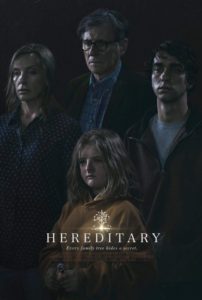
There is something revealing when you decide to watch a horror movie alone on a weekday — especially in the wake of a tumultuous breakup from a long relationship. Hereditary is a brutal, emotionally bruising move that left me more in love with horror than when I entered the theater. At first, I found comfort in its shock value; but on repeated viewings, I eventually began to read it as an exhibition of the horror of human revelation and affliction, the frenzied love that floods a person as a result of loss.
Toni Collette’s performance is a masterclass in female mourning and hysteria, her depiction of fear as her family falls apart right in front of her eyes. Her spiral into anger about having to balance her work and expectations to properly mourn her deceased mother, that blood-curdling scream when she finds her daughter’s decapitated body in the family car, and her look of terror during a sleepwalking bout as she dreams of setting her own son on fire. Her hollow eyes, frantic hands, the visceral femininity in her shrieks of fear and exasperation. It felt like a mirror was being held up to my own face.
My loss felt like a supernatural experience, like a ghost was being excavated from my body. I’d experienced the inhumane cruelty of losing my first love — but I’d also initiated the split, created this missing emotional piece, so how was I expected to mourn as a woman? There was a tradition set before me; I was supposed to weep in private, become single and available in public. There was no clear answer — I attempted to create more art, to slam more doors. I hated being touched, as it reminded me more of that loss. This is why I finally understood Toni Collette as Annie Graham.
From the beginning, Annie delivers a monotonous eulogy at her mother’s funeral, not even knowing who half of the people in attendance are, and asks her husband if she should be more sad that her mother has died. Her grieving process is shrouded in confusion; when she finally attends a therapy group for bereaved family members, she talks about her mother’s death as a way to explain herself. There is a performative aspect to mourning, that we put on like a mask, to let others know that we’ve lost someone important. But for Annie — someone who did not even want children, who resents her own mother — this type of pain is inaccessible. From the funeral, to the therapy groups, to attempting to sift through her mother’s belongings and later tossing them to the side, it all feels like an attempt to eradicate a burden.
Her expression remains languid and slack for the first half-hour of the movie. This is a woman unaccustomed to confronting traditional expectations of pain; she is undisturbed by this loss, but death is apparent on her pallid face regardless. For the men in the family — Steve, the father, and Peter, the son — this death is a nuisance, a side step from their daily routines. Steve is running around the house assembling the family to go, waking up Peter at the last second, meanwhile, their daughter Charlie is unable to cope with her grandmother’s passing.
The men are not only the major skeptics, but they lack an understanding of the physicality of loss and their responsibility to acknowledge it. For them, the funeral is an errand, eliciting sighs and boredom. After Charlie’s death, Peter denies the corporeality of her violent demise — quickly turning to avoid seeing her body in the back of the car; and silently listening to his mother’s wails from the shadows of the hallway, still with no direct apology or verbal acknowledgement of his role in her death. Steve is the same: His patience for Annie’s paranoia reaches its limit when he suggests that she exhumed her mother’s body and placed it in the attic. This new reading changes things; before, I had shamed Annie for seeming disinterested in her mother’s death, and for becoming fanatical after she discovers a way to speak with Charlie from the beyond. I didn’t recognize that at least on her part, this was an active participation in recognizing her loss, an attempt to expel it emotionally.
I was Annie, seeking a way to resurrect the image of someone I’d known before, and trying to reconcile the boyfriend I knew with the parts of him I didn’t understand until it was well over. I felt paranoid. I would get invited to parties and try to meet new people and end up crying in the upstairs rooms, hearing below me the muffled boom and chatter of human interaction that I felt devoid of. As I laid in my bed watching Annie sleep in her daughter’s treehouse, attempting to reconcile the distance between losing someone physically and having them still feel so close emotionally, I finally felt like I wasn’t crazy. The final lines of her monologue played in my mind on a loop, “if you could have just said ‘I’m sorry’ or faced up to what happened: maybe then we could do something with this! But you can’t take responsibility for anything, so now I can’t accept. And I can’t forgive. Because nobody admits what they’ve done!”
Nobody admits to what they’ve done, and I am not exempt from that fact. I betrayed my significant other’s trust by not trying hard enough, by not loving hard enough, through being inconsiderate of the other presence in the relationship. My emotional absence was the reason for my own heavy grieving. The way Annie grips the table in that scene, the way she explodes in anger and then shifts in demeanor once she reaches that catharsis — nothing felt more representative of my inconsistent bouts of lamentation.
Once Annie begins to indulge herself in the occult and communicates with Charlie via seance, there is a click. We see her smile, bringing her family together for the first time and closing up that wide space between them all. But even this attempt at reconciliation betrays, killing her and her husband , and allowing her son to become a vessel for Charlie in the afterlife. I tried to resurrect my own relationship during a short-lived reconnection, but things got even worse. It left a sour taste in my mouth, a second death worse than the first. In that final scene before Annie is possessed, her face reeks of guilt and shame. Her husband immolated before her; her mother’s mystery realized too late. Her grieving process is to blame for their downfalls.
When you reach this posthumous consciousness, your body betrays you, not creating the emotional response that you deserve and want to perform. I spent months after my break-up in this same state. That sense of “I did this to myself,” mouth agape wanting to cry and my face feeling dry. Weeping into mirrors to see how my grief really looked. Tossing away precious memorabilia. Screening through text messages and realizing where I lacked empathy, times when I felt like I was taking on the passivity of Peter and Steve by ignoring major signs and viewing my love as a chore. And I wondered how my ex had mourned, if he was quicker to move on, and if dwelling on this pain and loss was a chore for him as well and that thought only tore me apart more.
In the end, I lost myself like Annie. I dismissed the usefulness of timely mourning, trying to move on too soon, asking my ex to take me back without forethought. I was angry and wronged, finding happiness only at thoughts of rekindling something through dangerous and risky pathways. In my final act of mourning — weeping silently on my bedroom floor, keeled over and neck bent — I might have appeared decapitated to anyone that might’ve walked in. The paranoia, the warped realities, prophetic dreams of chaos, even at its extremes where bodies are missing heads and the world is burning — that’s what the body goes through when we experience a significant loss. The horror of having to make up for that lost space and time, and only realizing that it was too late, as I was left to mourn alone.
Nia Tucker is an undergrad at Emerson College studying Writing, Literature and Publishing. She originally hails from Long Island and is Jaboukie’s Sicilian cousin twice removed. You find more of her work—personal essays and race-related features—at niatuckwrites.wordpress.com and her unfiltered thoughts on twitter at nee_yahh.
This post may contain affiliate links.







